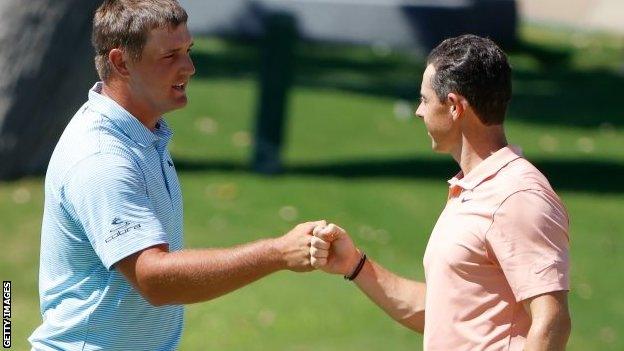World ranking points for PGA Tour results 'unfair' in current climate
- Published
- comments

World number one Rory McIlroy (right) played with American Bryson DeChambeau on the final day as 15 of the world's top 20 competed in the PGA Tour's return event at Colonial Country Club
It was refreshing to finally watch sport made properly tantalising by the absence of knowledge of the eventual outcome.
The resumption, behind closed doors, of the PGA Tour had television, radio and website audiences on tenterhooks during a thrilling final round. Cheers, gasps and groans would ordinarily have abounded in Texas on Sunday.
It was great stuff that deserved more than the discomfiting eerie silence that accompanied a dramatic denouement when Collin Morikawa's short miss allowed fellow American Daniel Berger an emotional play-off victory.
But while the return to genuine competition was more than welcome, there should be unease about some of its consequences. It is not that the 27-year-old took home $1.35m (£1m) in prize money but that he received a huge amount of world ranking points.
Berger jumped from 107th to 31st in the standings. He is now ensconced in the all important top 50 and able to plan a schedule that can include all the biggest tournaments.
It is significant reward for an admittedly courageous victory, made all the more commendable given the way this son of former American tennis star Jay Berger has battled back from potentially career threatening wrist problems.
But, in current circumstances, the way he has leaped up the rankings is not fair on much of the rest of the golfing world. There will be a sense of injustice among players unable to compete on the PGA Tour at the moment.
Normally such feelings can be justifiably countered by a brutal but simple maxim, that all pro golf problems can be cured by playing better. Competing professionals readily buy into this rationale; it is part of the deal.
Good play earns due opportunity and reward. Equally, they accept lost form means diminished playing status and tournament opportunities.
But this uncomplicated reasoning is not currently applicable. It cannot counter a thread of geographical unfairness running through men's golf.
Large swathes of the global game have no chance of "playing better golf" because they cannot compete because of the coronavirus pandemic. Those based in the US, therefore, have a distinct and unjust advantage in terms of these crucial rankings.
European, Asian and Sunshine Tour players are watching from afar. These are supposed to be "world" rankings yet the only place they currently apply is in the US.
When it was announced a restart of the rankings would coincide with the resumption of the PGA Tour, England's Matt Fitzpatrick - who actually played at Colonial Country Club - tweeted: "Very unfair, can't understand this!"
European Tour boss Keith Pelley had voted against the move but he was a lone objector on the board that controls this vital metric for the game.
Through absolutely no fault of their own, Britons such as Lee Westwood, Eddie Pepperell, Robert MacIntyre and Paul Waring have slipped a few spots as a result of last week's event in Fort Worth.
Tournament officials have said they will take into account standings as they were when they were frozen in March "as part of the qualification criteria for their events".
But it is not absolute and introduces a degree of subjectivity to a sport that usually lives by straightforward and uncompromising numbers. The scorecard does not lie and nor should the world rankings.
There is also an impact further down the pecking order. American Luke List won the Korn Ferry Tour event at Sawgrass last Sunday and climbed from 180th to 136th in the standings.
It might not seem much of a difference but does make reaching the significant landmarks of top 100 and 50 more tenable. It also means that crucial task is now a little harder for the likes of Scotland's Calum Hill (139th) and Englishman Andy Sullivan (142nd).
Both Britons tumbled a couple of places without having the chance to do anything about it.
"Many players will not have the opportunity to compete for ranking points until a later date," rankings officials accepted in their statement.
"The averaging formula used in the calculation of the ranking will help to mitigate any resulting impact, be it positive or negative to a player's ranking."
Compromises are the way of the world in these uncertain times, but when the ability to compete is governed as much by quarantine as playing status it is unfair to give extra advantage to those able to play.
Not that this should take away from a current generation of young Americans taking over the upper echelons of the men's game. The evidence at Colonial was pretty overwhelming.
Berger and Morikawa (23) were among a number of US 20-somethings who were prominent in a stacked field last week and have potential to dominate golf for years to come.
The big-hitting and bulked up Bryson DeChambeau (26) looks a fearsome force, if his frame can stand its new muscle-bound condition, and Xander Schauffele (26) is a major winner in waiting.
Justin Thomas (27) is number three in the world and Jordan Spieth, a year younger, is already a three-time major champion. The Texan looks like he may, at last, be ready for a first win since his Open triumph of 2017.
Brooks Koepka (30) has four majors in the past three years and inspires the extraordinary crop of talent currently assembling in the United States.
They represent a huge competitive challenge to the rest of men's golf and certainly do not need extra help from the current imbalance in the workings of the world rankings.
